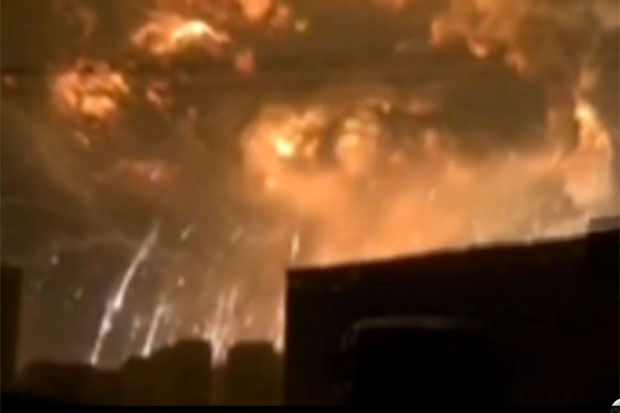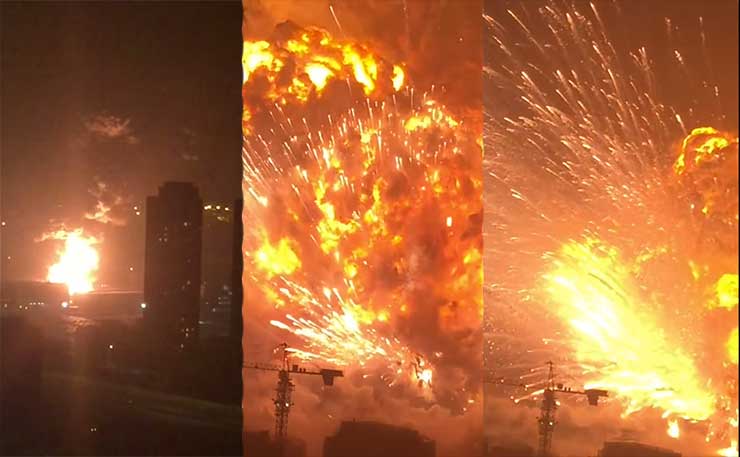Fire and explosion engulfed a large area of Tianjin’s Tanggu industrial park on Wednesday night. The damage was extensive. Multiple mobile phone video footages shot by nearby residents recorded moments of fire and two gigantic explosions, which produced the equivalent of two minor earthquakes and shook buildings kilometres away. It has also shaken the nation.
The death toll has already climbed to more than 80, with some still unaccounted for and about 700 injured and hospitalised. The casualties include workers in and around the area, and firefighters who were quick at the scene only to find themselves in the way of the blasts. As the toll is set to rise in the coming days, it is already one of China’s worst industrial accidents, and certainly one of the most discussed in recent years.
The location of the incident is a warehouse owned by a Chinese logistics company. It has reportedly stored hazardous materials including inflammable chemicals in containers. To compete for more investment and hence higher gross domestic product, Tianjin – like other cities in China – is eager to lure companies with tax concessions and loose labour and safety regulations to its industrial parks. This has proved to be a recipe for industrial accidents.
Industrial accidents, if they can be called accidents in such a regulatory environment, have been regular occurrences during China’s state-led industrialisation. With the local authorities turning a blind eye, occupational health and safety are sacrificed for profit maximisation for companies, and spectacular growth figures for the authorities.
But it is the Chinese workers who have borne the brunt of the human costs.
Back in 1993, the infamous fire at a Shenzhen toy factory claimed the lives of 87 workers because they were not able to escape from locked doors and windows. But in the next two decades, China continues to produce industrial accidents. In particular, it has been notorious for coalmine disasters that put the lives of hundreds of workers at risk.
Although occupational safety has generally improved in recent years, industrial accidents have remained. Just last year, an explosion at an auto parts factory in Kunshan killed 97 workers and injured many more. And over the last few months alone, dozens of serious industrial incidents have taken place.
As usual with such tragic events in China, many questions have been raised in its aftermath. One is why the warehouse of hazardous materials is located so close to residential quarters.
Modern high-rise apartment blocks are seen not very far from the industrial park. China’s rapid urbanisation offers some clues.

With millions moving and settling in the cities each year, housing prices have been steadily rising. It makes financial sense to build as many apartments as possible on valuable land, and not worry too much about its location near an industrial park.
More broadly, China’s environmental protests in recent years have been staged explicitly against the building of chemical factories and incinerators close to population centres.
Many have questioned the safety standards of the logistics company. The media has reported that the company violated packaging standards during an inspection two years ago, and the local authority was recently in talks with the company about safety.
It is not yet clear what exactly caused the initial fire and then the secondary explosions. In response to public grief and anger, the government has announced emergency measures and detained senior managers of the company. It has also launched a nationwide inspection of businesses engaged in dangerous chemicals and explosives.
And, in the public outpouring of grief for the firefighters, light has been shone on their employment conditions. It turns out that many frontline firefighters are on casual, labour-hire contracts.
In China’s industrial relations system, their contracts are signed with a labour-hire company, and their awards and benefits are scaled lower than permanent employees. Moreover, many of the workers employed in the logistics company are similarly on such casual contracts.
The accident also comes at a politically delicate time for the government. In recent months, it has poured a great deal of resources into planning a military parade on the anniversary of end of the Second World War on September 3 in the neighbouring capital city of Beijing. In order to boost its nationalist credentials, the government has focused the public to the remembering of the nation’s struggle against Japanese imperialism and contemplation about modern day dangers posed by those in power in Japan today.
But with such a serious industrial accident dominating the public agenda, it could prove to be more than an unfortunate distraction for the government. It is already a test of the government’s ability to handle crisis amid heightened public expectations and criticism.
On that front, it has to be said that the government has come a long way in crafting crisis management strategy since the SARS outbreak in 2002. Widely criticised for its initial cover-up and inaction that missed the opportunity for early response, the authority has learned the hard way over the last decade about prompt and effective response.
More recent memory of the mismanagement of the Wenzhou train crash, with the government’s alleged attempt to cover up and restrict information, is still fresh in the minds of the present generation. And incidents like the capsized ship in June this year that resulted in the death of hundreds of elderly tourists continue to pose challenges for the government. It well understands the political costs of mishandling a crisis.
The fact that the public’s prior scepticism bordering on cynicism often comes well before the government does anything, makes it an even bigger challenge to spin it into a positive story about national unity in the face of tragedy and the competent and caring role it plays.
Judging by social media commentary, however, it does not look promising for the government. In particular, the focus has been not only on the effectiveness of response, but also its transparency. The public feels the government is hiding its own guilt when releasing information. While the accident is reported widely, criticism of restrictions on media coverage is taken as evidence of a setback for government accountability and investigative journalism.
The public’s anger and cynicism have been driven by a lack of political trust in a monolithic political structure attempting to govern and restrain a pluralising and fragmenting society. China’s social media has served as a platform and echo chamber for such criticism. Although the authority has learned to respond swiftly to individual incidents, be it a corruption scandal or a protest, it has done poorly at reforming its institutions, still believing things can be managed.
But the highest echelon has known for a long time that the government is losing legitimacy in the eyes of the public, even though it has delivered growth and stability for the last three decades. Whether it is the China Dream, the widening anti-graft campaign, the New Normal of economic growth, or the upcoming military parade, the common message underlying all this is one of restoring confidence in the government’s ability to preside over a prospering, socially just and environmentally sustainable nation.
Needless to say, this is no easy task. The early stage of the stock market crash, when the government’s intervention failed to arrest the price falls, offered a glimpse of the risks. Fortunately for the government, it has come out of the crash looking reasonably competent, having halted the crash at least for now. Nevertheless, it has left doubt. And what if the stock market crashes again, and what if the state intervention will not work?
The extent to which the government’s management of the Tianjin disaster is able to avoid damage to public confidence or even come out positively will be crucial for an administration already under great strains.
Failure of its political response to the disaster may well undermine its legitimacy in managing a slowing economy and intensifying social conflicts.
* Kevin Lin is a PhD student in the China Research Centre at the University of Technology, Sydney.
Donate To New Matilda
New Matilda is a small, independent media outlet. We survive through reader contributions, and never losing a lawsuit. If you got something from this article, giving something back helps us to continue speaking truth to power. Every little bit counts.





